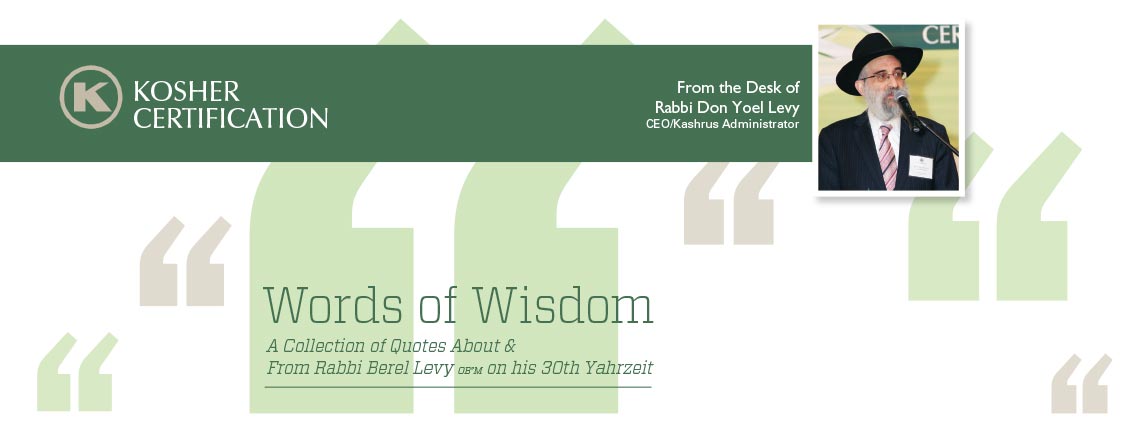 “Always go back to the source,” and “Never be afraid to confront any obstacles,”
“Always go back to the source,” and “Never be afraid to confront any obstacles,”
were my father’s, ob”m, way of life.
He was never afraid of something new. Toward the end of his life, when we at the OK were being mercilessly attacked, I asked him what he would do if something happened to the OK. He answered, “So? I will start something new.” This was when he was in his sixties!
His desire to go back to the source led him to the four corners of the world. He was a pioneer in kashrus with his methods and his policy of visiting even far flung areas. He was the first to extensively visit the Far East for kashrus and had just returned from an extended visit to China before he passed away.
He was never afraid of something new. Toward the end of his life, when we at the ~ were being mercilessly attacked, I asked him what he would do if something happened to the OK. He answered, “So? I will start something new.” This was when he was in his sixties!
His desire to go back to the source led him to the four corners of the world. He was a pioneer in kashrus with his methods and his policy of visiting even far flung areas. He was the first to extensively visit the Far East for kashrus and had just returned from an extended visit to China before he passed away.
Dial-Clock Magazine dubbed Rabbi Levy,
“The Sherlock Holmes of the food industry.”
“Personality clashes are counter-productive: they sap our energies and leave us too weak to do our best in bringing our mission to fruition.”
“He had no patience for anything but the optimum standards on compliance and efficiency,”
recalled Ira Axelrod.
In 1979, Rabbi Levy told the New York Times that he had already logged millions of miles. The reporter described him as having
“the sinews of a young man and the gray beard of a patriarch…”
“He made no secret of his feelings – his way was far superior.”
Ira Axelrod
“He was much more than the others; he was much stronger,”
Rabbi Yosef Wikler, publisher of Kashrus Magazine.
“Unquestionably, we could provide supervision for many more hotels on the North American scene,” he wrote. “But we are not ready to compromise our principles. OK Laboratories has built a reputation of being scrupulous in its hashgacha: it does not give its certification easily or take its responsibilities lightly.”
In April 1973, he wrote,
“I am not infallible. If, chas v’sholom, I make a mistake, I will be the first to rectify it.”
“Rabbi Levy liked to say, the question we ask should not be whether a food is treif, but rather, ‘Is it kosher?’”
“He never felt that he was a posek,”
said Rabbi Avraham Feigelstock, who leads a kosher agency in Vancouver, Canada.
“He would tell me, ‘I will call Rabbi Feinstein.’”
When rumors began to circulate that the OK’s largest competitor, the OU, supervision was not adequate, he stood up for them in the November 1971 issue of the Jewish Homemaker: “Let me say earnestly for all to see and hear: the rabbi who administrates the kashruth supervision of the OU is one of the most sincere and revered rabbis in the field of kashruth and has more mesiras nefesh for the dissemination and observance of genuine kashruth than any one person I know.”
“Foods must be definitely kosher before you eat, not definitely treif!”
Rabbi Levy wrote in April 1976,
“I mention above how difficult it is to supervise one’s own kitchen for Pesach for a small group – how much more so for thousands of Jews.”
Rabbi Levy wrote in April 1976,
“I mention above how difficult it is to supervise one’s own kitchen for Pesach for a small group – how much more so for thousands of Jews.”
And though his criticism of other agencies was sometimes withering, he never named them explicitly. “We are only human,” he wrote in February 1978, “and pray to the Almighty that these accidents be at a minimum.”
Rabbi Levy wrote in a June 1985 article,
“I honestly do not know what people mean by this. I am not running for office and removing a hechsher does not make me popular in the eyes of the public.”
“I’m working for people, serving people and trying to make the world a better place to live.”
“I have been told by companies that the OK is too difficult to deal with, ‘therefore we must change our supervising agency.’ Our readers surely understand what this means. If a company is not cooperating with the supervising agent and knows there is another kosher certifier waiting in the wings to grab the certification, you can imagine what can happen to kashruth!”







